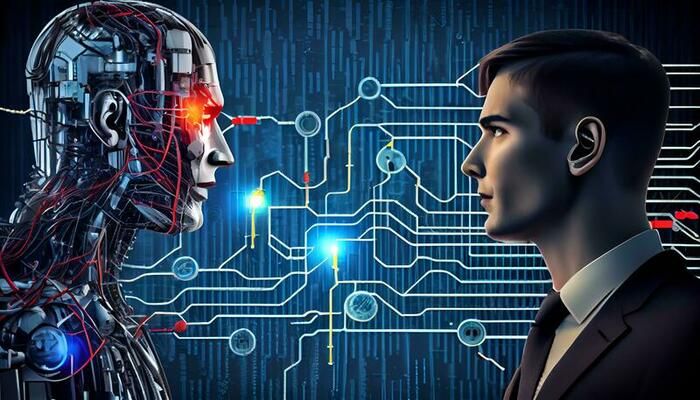1. AI-Powered Healthcare Robotics

AI-enabled robots are reshaping healthcare by combining precision with human expertise. From performing minimally invasive surgeries to assisting in patient care, these robots ensure better outcomes and faster recovery times. Intelligent systems use real-time data to personalize treatment plans, reduce diagnostic errors, and streamline hospital operations.
Professional Advice: Healthcare providers should integrate AI-driven robotics into diagnostics, surgery, and patient monitoring. Continuous staff training and data integration are vital for achieving operational excellence and patient trust.
2. Intelligent Manufacturing Robots
AI-driven robots are revolutionizing manufacturing by adapting to dynamic market demands. These robots analyze real-time data to detect production bottlenecks, prevent equipment failures, and improve quality control. Predictive maintenance powered by AI reduces downtime and boosts output efficiency.
Professional Advice: Industries should prioritize investment in AI-enabled robotic systems for precision and flexibility. Combining AI with IoT sensors will allow smart factories to run autonomously while maintaining high safety standards.
3. Real-Time AI Control Systems
AI control systems enable machines to make autonomous decisions based on live data streams. Such systems enhance responsiveness and adaptability, making industrial processes faster and more efficient. They eliminate delays associated with manual monitoring and allow businesses to maintain optimal productivity levels.
Professional Advice: Organizations should deploy AI control systems for real-time analytics and decision-making. This approach ensures operational agility and provides a competitive edge in dynamic market environments.
4. AI Robotics in Logistics and Supply Chain
In logistics, AI-powered robots are transforming how goods are stored, managed, and delivered. Autonomous vehicles and warehouse robots handle complex inventory tasks with exceptional accuracy and speed. This reduces labor dependency and enhances delivery reliability.
Professional Advice: Companies must adopt AI-based logistics systems to improve efficiency and customer satisfaction. Early adoption of autonomous delivery robots and intelligent tracking systems will future-proof operations.
5. AI-Driven Service Robots
Service robots equipped with natural language processing (NLP) and emotion recognition are redefining customer interactions in hospitality and retail. These robots respond intelligently to customer queries, analyze preferences, and personalize services.
Professional Advice: Businesses should invest in adaptive service robots that learn from customer feedback. Integrating these systems with CRM platforms will improve engagement, loyalty, and long-term revenue.
6. Human-Robot Collaboration (Cobots)
Cobots are AI-powered robots designed to work alongside humans safely and effectively. They assist in repetitive or physically demanding tasks while learning from human gestures and speech patterns. Cobots promote efficiency, safety, and comfort in shared workspaces.
Professional Advice: Organizations should design ergonomic environments for cobot integration. Regular AI updates and worker training ensure harmonious collaboration and continuous process improvement.
7. AI in Construction Robotics
AI-powered machines like robotic excavators, 3D printers, and bricklaying robots are modernizing construction sites. They enhance accuracy, reduce human error, and improve safety standards. AI also optimizes project timelines and resource use by analyzing large datasets.
Professional Advice: Construction firms should adopt AI project management tools and robotic process automation. These innovations increase productivity, reduce costs, and enable sustainable infrastructure development.
8. AI-Enhanced Drones for Construction and Surveying
AI-driven drones are transforming site monitoring and surveying by providing real-time data and hazard detection. They help ensure that projects stay on schedule while maintaining safety standards.
Professional Advice: Companies should deploy AI drones for inspections and progress tracking. Integrating drones with AI analytics tools enhances decision-making accuracy and project transparency.
9. Machine Learning in Design and Planning
Machine learning enables architects and engineers to simulate and predict project outcomes before construction begins. AI assists in optimizing designs for sustainability, cost efficiency, and performance.
Professional Advice: Engineers should adopt AI simulation tools to minimize design errors and forecast risks. Continuous data-driven learning ensures improved future planning accuracy.
10. AI Robotics in Space Exploration
AI robotics have become indispensable in space exploration missions. Autonomous robots like NASA’s Perseverance rover can navigate challenging terrain, collect samples, and conduct experiments without human guidance.
Professional Advice: Space agencies should expand AI autonomy in exploration missions to enhance data accuracy and reduce human risk. Investing in AI-driven navigation and maintenance systems is key for future interplanetary success.
11. Disaster Response and Rescue Robots
AI-powered robots equipped with sensors and thermal imaging play a crucial role in disaster management. They can detect survivors, navigate hazardous zones, and perform search-and-rescue operations faster than human teams.
Professional Advice: Governments and NGOs must establish AI rescue units for emergency preparedness. Collaboration between robotics firms and disaster agencies will improve readiness and save lives.
12. AI Robotics in Retail and Hospitality
Retail and hospitality robots enhance efficiency by managing inventory, assisting customers, and delivering personalized service. Through AI analytics, they learn consumer behavior to offer tailor-made recommendations.
Professional Advice: Businesses should integrate AI with CRM systems to optimize customer experiences. Regularly updating AI models ensures that robots remain responsive and empathetic to customer needs.
13. Swarm Robotics for Collective Efficiency
Swarm robotics uses large groups of simple robots working together under AI coordination. Inspired by insect behavior, these robots handle large-scale tasks like environmental monitoring, precision farming, and search missions.
Professional Advice: Researchers should focus on swarm communication and coordination algorithms. Companies can adopt swarm robotics for scalable, cost-effective operations in agriculture and environmental projects.
14. Ethical and Economic Implications
As AI robotics evolve, ethical and socio-economic concerns arise — including job displacement, data privacy, and accountability. Responsible AI adoption requires governance frameworks to manage these risks effectively.
Professional Advice: Policymakers and businesses must develop transparent ethical standards for AI. Upskilling the workforce will ensure a smoother transition toward a robotics-driven economy.
15. The Future of AI-Driven Robotic Revolution
AI and robotics together mark the dawn of a new industrial age. Their combined potential promises smarter workplaces, sustainable infrastructure, and improved quality of life. Early adoption is the key to maintaining competitive relevance in this transformative era.
Professional Advice: Organizations should focus on a balanced strategy — combining human creativity, AI intelligence, and continuous innovation. Those who invest now in AI robotics will define the next generation of global progress.